Hong Kong's "South China Morning Post" recently published an article saying that under the impetus of Alibaba and Jingdong, China's express industry has developed rapidly. Now, the two e-commerce giants are investing in new logistics technologies, hoping to further reduce logistics time.
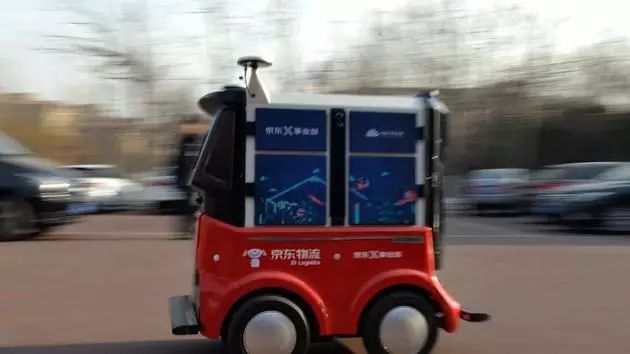
The following is the full text of the article:
On an open space in the Hangzhou International Expo Center, curious people smashed out their mobile phones, and the objects they shot were the robots that were being displayed here. In an area, the robots seem to have their own will, moving around in the open space, they pick up the goods in the sorting area, and then put the goods into the collection bag, which writes different places, they Will be sent to the various receiving areas in China.
Here is the annual Global Smart Logistics Summit. In another pavilion, several Automated Guided Vehicles (AGVs) are reminiscent of Roomba's robotic vacuum cleaners, which are swam between metal shelves filled with courier boxes. No matter where you look, you see high-tech logistics technology, from drones that can carry up to one ton of cargo, to drones that can travel on the street and deliver goods to the doorstep of consumers. car.
These new devices are the latest attempts by Chinese companies in logistics, and they hope to make express delivery more efficient in this way, whether it is in a sorting center where a large number of parcels are gathered, or before the parcel is delivered to the consumer. The last mile", these robots can play an important role.
Although the timeliness of express delivery has been greatly improved in the past few years, Ma Yun, founder and chairman of Alibaba, still has a more ambitious goal. He wants his logistics department to complete international parcels within 72 hours. Delivery. In order to accomplish this goal, he has already prepared for more than 100 billion yuan in investment.
In the past few years, thanks to the rapid development of e-commerce, China's express delivery industry has also developed rapidly. In the current China, about 130 million parcels are sent to consumers every day. Ma Yun said that China's express delivery The number ranks first among all countries in the world.
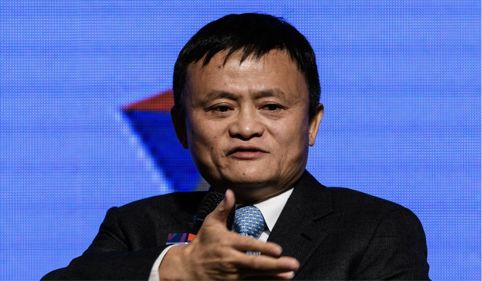
Ma Yun
The surge in business has also made the founders of Chinese express delivery companies a billionaire. In 2017 alone, seven Chinese logistics companies have completed their listings. Today, the total market capitalization of SF, Zhongtong, Shentong, Yuantong, Baishi, Yunda and Debon has reached US$82 billion.
How fast is the current level of China's express service development? In many cities, the same city delivery can usually be completed in one day, and even some express delivery in the same province can be delivered within one day. In the first-tier cities, such as Shenzhen and Beijing, express delivery between these cities can usually be achieved on the next day.
Earlier this month, Ma Yun said at the Global Smart Logistics Summit in Hangzhou: “The average time for global distribution was about 70 days five years ago... And today, the express delivery time between China and other major countries in the world has already Shortened to less than 10 days."
In this revolution in express delivery services, China's largest e-commerce company, Alibaba and JD, played a huge role. Both companies want to provide consumers with fast delivery and better service, so they invest heavily in logistics infrastructure.
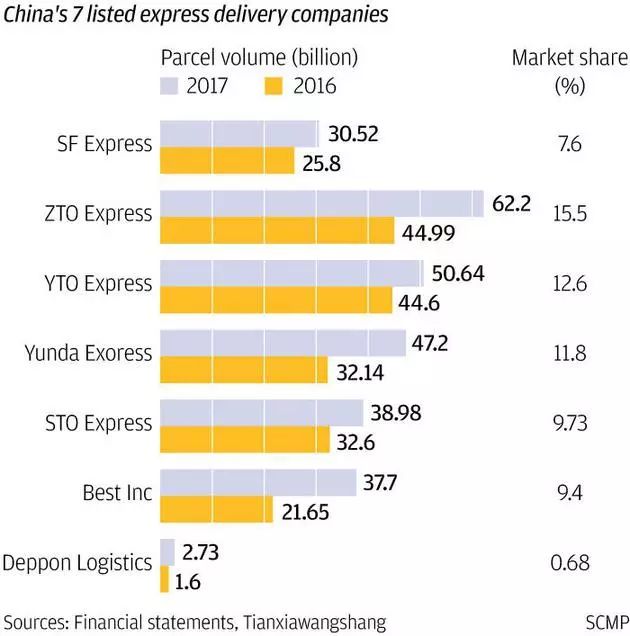
China's seven listed express delivery companies, the volume and market share
Neil Wang, president of Greater China at consulting firm Frost & Sullivan, said: "The development of e-commerce has helped the development of the logistics industry from two aspects. First, it has attracted more companies to enter the logistics industry. Not only has it increased the number of express delivery companies, but also promoted the quality of their services – the quality measurement dimensions of express delivery companies include delivery time, on-time delivery rate and loss/loss of goods – thus enhancing the customer experience.â€
He added that a large amount of capital has flooded into China's logistics industry, allowing the rapid development of the modernization of Chinese express delivery companies, and the creation of a large amount of user information and logistics data that can be used by enterprises to further improve logistics and The efficiency of the supply chain.
Wang Haoquan said: "Logistics experience is an important part of the online shopping experience. Long delivery times and frequent delivery delays, goods are damaged or even lost, will allow consumers to abandon online shopping, return to the physical store to buy thing."
However, in terms of logistics infrastructure construction, Jingdong and Alibaba chose two completely different roads.
Alibaba has always adopted a light asset strategy. In 2013, the company set up its own logistics department rookie. This department cooperated with other express companies to create an open source and standardized logistics service. JD.com decided to build its own logistics network, build a large number of warehouses, carry out large-scale distribution personnel recruitment, and provide distribution services for consumers in China. Their approach is very similar to that of American enterprise Amazon.
Two different approaches reflect the business models of the two companies. Alibaba's e-commerce platform includes Taobao and Tmall, both of which are online platforms for third-party merchants. At the beginning, Jingdong adopted a self-purchasing business model and sold the goods directly to consumers. Although JD.com has previously introduced third-party sellers on its platform, sales of self-operated goods still account for a large portion of the company's overall business.

Alibaba's rookie has already cooperated with 15 major express delivery companies in China. They also have thousands of other courier partners internationally. All of these courier companies can use the rookie data platform, the data provided by this platform can help express companies predict the amount of delivery, especially at peak times, such as before and after the Singles Day.
The company said that the rookie has helped a number of courier companies to standardize their electronic face sheets. The advantage of this type of order is that the rookie's courier partners can manage and track all the couriers sent out by the rookie on a platform. In addition, on the rookie platform that has access to Taobao and Tmall, merchants can choose the best route and their preferred courier company, so the rookie can increase the efficiency of delivery and bring more orders to the courier company.
But in recent years, rookies have also begun to invest in physical logistics infrastructure and innovation. At this summit in Hangzhou, Ma reiterated that rookies would not run their own logistics business, but they would invest their money in things that their partners could not or would not do.
Tom Birtwhistle, PwC's China Digital Strategy Director, said: "China has huge opportunities in e-commerce, which means that companies must be willing to invest in this network. In China, express delivery companies The operating costs are still relatively low, as many 'last mile' distributions are done by humans riding electric vehicles... In terms of labor costs, the barriers faced by Chinese express delivery companies are not as high as those of European and North American companies. ."
In September last year, Alibaba took control of the rookie control. After that, Alibaba said that they would invest 100 billion yuan to build an efficient logistics network. Their goal is to complete domestic 24-hour delivery and international 72-hour delivery.
As part of increasing distribution efficiency, the rookie has invested heavily in technology development, and has entered into a partnership with companies such as Kuocang, deploying many automated guided vehicles that can take half a ton of cargo from the shelves.
The rookie has also reached a cooperation with state-owned automaker FAW, and the two sides will jointly develop unmanned trucks for long-distance distribution. In addition, the rookie is also working with the unmanned technology company Sagitar. The two sides will build an unmanned logistics vehicle called Little G Plus, which is the first to use MEMS solid-state LiDAR. ) Technology of unmanned vehicles.
The MEMS solid-state laser radar used by Sagitar is equipped with a mirror that is only a few millimeters wide, which can emit laser beams in multiple directions and quickly scan nearby environments to enable driverless cars to “ See "walkers around, signs and potential obstacles.
Since no moving parts are used, such as rotating mirrors commonly found in conventional lidars, MEMS solid-state lidar sensor technology may reduce the cost of laser radar detectors in driverless cars. These rotating mirrors in the lidar must send laser radiation to the environment.
Zhang Chunhui, the leader of the rookie ET Logistics Lab, said in a visit: "MEMS will reduce the cost of the sensor by about two-thirds, which allows it to be used on unmanned vehicles on a large scale."
He also revealed that the Little G Plus vehicle is currently being tested on the street, which has a speed of 15 km/h, which is a very reasonable speed – neither too fast (not for pedestrians and vehicles) Causes danger), not too slow.
In addition, the rookie has also reached a cooperation with Beihang Intelligent Unmanned Flight System, a company born in Beijing University of Aeronautics and Astronautics. The two sides will jointly develop express drones, which may become the largest in the world. The civilian drones help logistics companies to deliver goods in remote areas of China. The drone's wingspan has reached nearly 20 meters and can fly 1,500 kilometers, it will be able to load up to one ton of cargo.
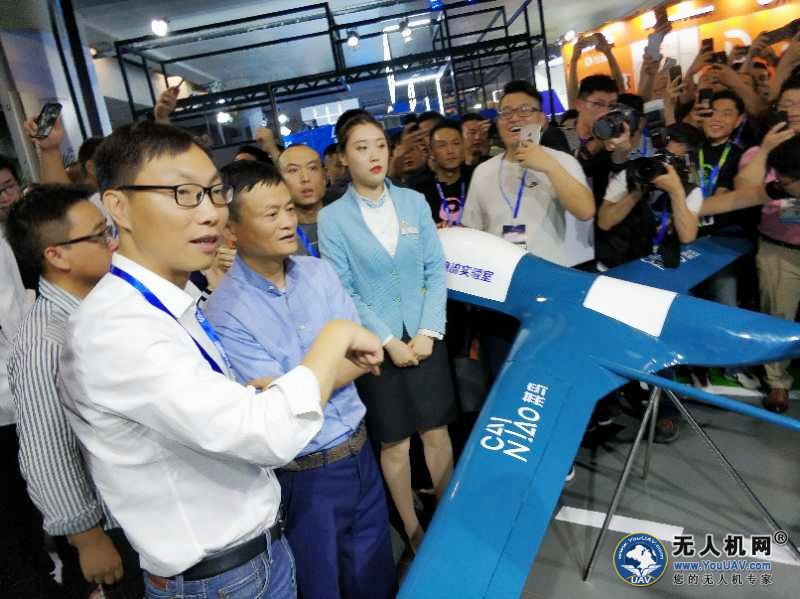
Ma Yun learned about Beihang Logistics UAV
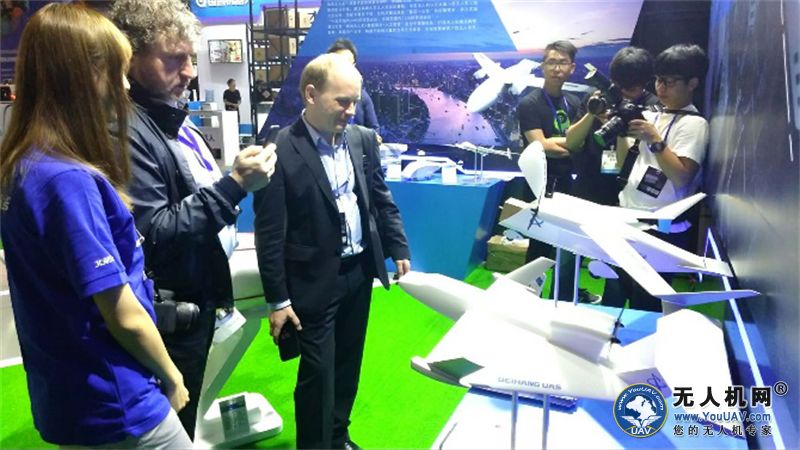
International guests observe and consult Beihang drones
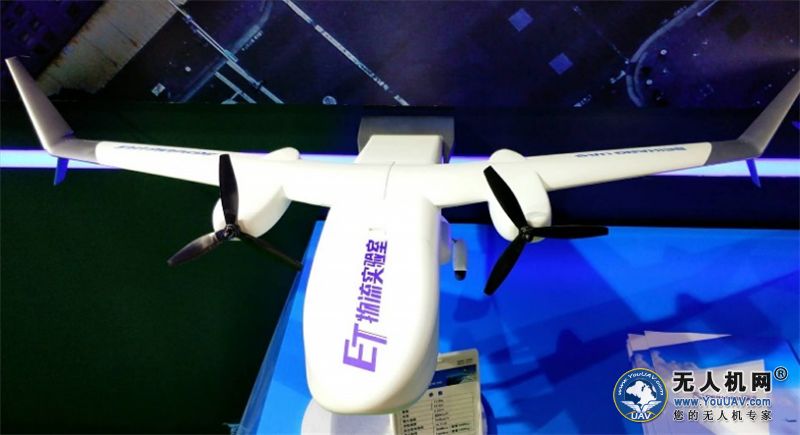
Beihang Logistics UAV (Model)
In addition to Alibaba, JD.com has also made large-scale investments in logistics technology. In May of this year, the company released their unmanned truck technology, which was developed by the company's research center in the United States. The truck reached Level 4 unmanned technology. The so-called Level 4 driverless is the vehicle that can handle all driving functions without human intervention and can guarantee safety.
Xiao Jun, president of Jingdong X Business Unit, said at a media meeting last month that the truck is capable of unmanned work on public roads, but it still needs to learn how to read traffic lights. Xiao Jun said: "If our technology can only reduce the number of drivers required for a truck from 3 to 2 or one person, then this technology is of little value. We want to develop a completely unnecessary one. Human truck."
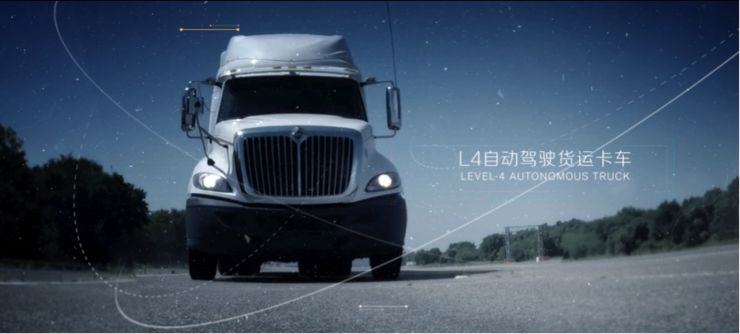
Jingdong unmanned heavy truck
Like the rookie, Beijing-based Jingdong has also developed a small unmanned distribution vehicle that is currently being tested on some university campuses in Beijing. In addition, Jingdong also tried to use drones for delivery in remote areas. They opened a distribution drone operation dispatch center in Suqian, Jiangsu.
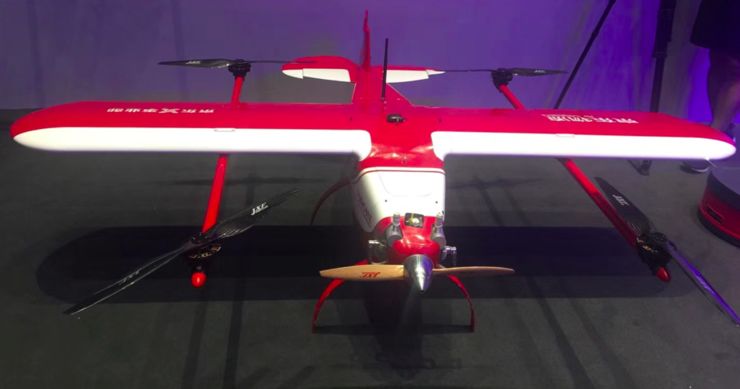
Jingdong drone
Jingdong said that the company currently has 500 warehouses and nearly 7,000 sorting centers, which allows 90% of their orders to be delivered on the same day or the next day.
The innovation competition between the two companies is not limited to picking and distribution. Jingdong and Alibaba are also focused on improving the user experience by providing consumers with convenience in a variety of ways, allowing them to receive goods at any time of the day and increasing the number of items that can be delivered by a single attendance.
At present, many companies in China are operating smart express cabinet services. These companies place a large number of express cabinets in the occupants, and the delivery personnel can place the items purchased by the customers in these courier cabinets, and then the courier will send a message to the consumer with the pick-up code. The consumer can When convenient, the goods are taken in the courier by picking up the code. This new delivery method eliminates the need for the delivery personnel to negotiate delivery time with the consumer.
China Post is one of the many companies that are running this business. The company said it has placed more than 90,000 functional express cabinets in more than 80 cities. Fengchao is another smart express cabinet company. The company said that they have “delivered†7% of all express delivery in China.
At this summit in Hangzhou, the rookie also released a device called the rookie smart express tower, which consumers can install outside the home. This courier tower can be extended longitudinally to hold larger packages. In addition, it can adjust the internal temperature, which can be used to place goods that require higher temperatures, such as pizza. In addition, this express tower also has a face recognition function to ensure that only the consumer can open it to ensure the safety of the goods. The company said that many consumers who love pizza have become interested in the device, although the device is not yet officially available.
Although both Alibaba and JD.com have invested heavily in logistics infrastructure, China Express still lags behind many other countries in terms of express delivery quality. In 2016, in the World Bank's logistics performance rankings, China ranked 27th, behind China's Taiwan (25), South Korea (24), Japan (12) and Hong Kong (9). This list ranks all markets based on data from each market's logistics environment, core logistics processes, industry management and delivery times and prices.
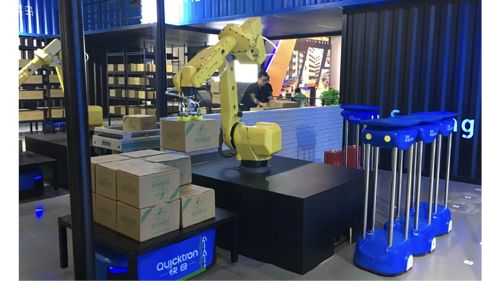
Ma Yun said in Hangzhou that the rookie hopes to reduce the logistics cost in China's GDP to 5%, and the current logistics cost in GDP is about 15%.
PwC's Bettvisto said: "China is a very attractive market, and companies are willing to build large-scale supply chain solutions here. But many companies have made a mistake, because they think that China has experienced an electronic Business growth miracles, so they think the same thing will happen in Southeast Asia and India, but the reality is that the penetration rate in these areas is still very low. If you don't have a national or overseas supply chain network, then you can't Serve most people in this market."
Betvisto believes that Southeast Asia is also a very fragmented market. There are many islands and the level of urbanization is not high, so it is very difficult to build an efficient logistics network here. Companies such as Alibaba have seen the potential of e-commerce in Southeast Asia. They have already cooperated in countries such as Malaysia and Thailand. The two sides have established electronic free trade zones and invested in some local logistics companies, such as Singapore Post. Service company Singpost.
Betvisto said: "In the supply chain, you need to invest before the demand arises."
Anti-Jamming RC Arc Extinguisher
Anti-Jamming RC Arc Extinguisher
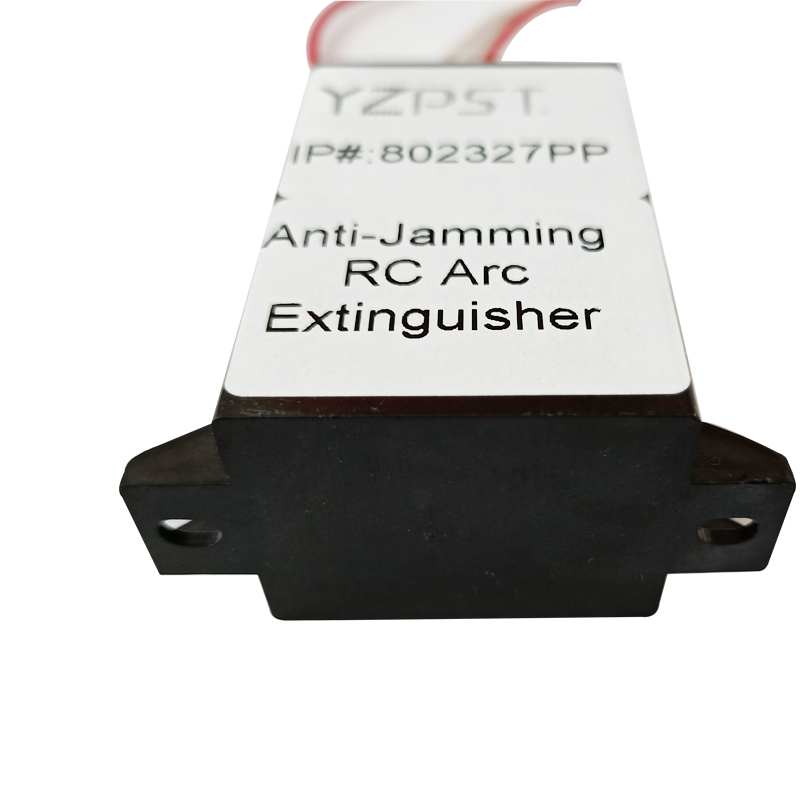
Anti-Jamming RC Arc Extinguisher
YANGZHOU POSITIONING TECH CO., LTD. , https://www.pst-thyristor.com